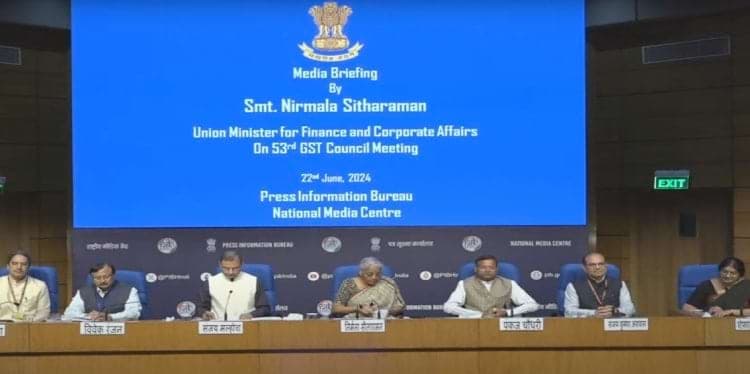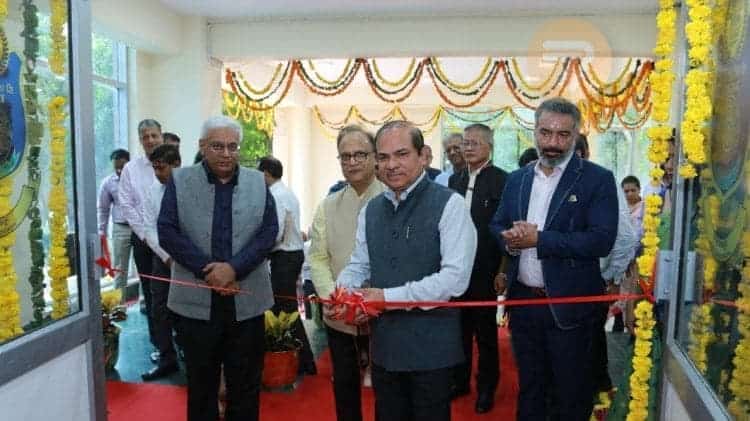Budget Will Be Set Up with Existing GST on Online Gaming
01 Jul 2024
Smt. Nirmala Sitharaman Press Conference following the 53rd GST Council Meeting. Image: Press Information Bureau India.
Item Was Not on the Agenda. Next GST Council Meeting Likely in August
The heavy 28% GST burden over entry deposits in casinos and online games was not relieved by the 53rd GST Council Meeting. The matter didn’t even enter the agenda, along with several other items.
“It wasn’t on the agenda. It didn’t come for discussion, it wasn’t taken up,” Union Minister of Finance Nirmala Sitharaman told the media at the Press Conference following the Meeting.
Despite the current setback, there is glimmer of hope for the Indian online money gaming industry. The long-awaited review of the new levy could theoretically bring about a positive change. It could even do a roll-back of the tax. Something industry representatives keep pleading.
The Union and State Finance Ministers agreed to hold the next GST Council Meeting “at the earliest possible date after today.” They will discuss any urgent matters that did not make it to the 53rd Meeting’s agenda.
“While there were a lot of agendas, a considerable number was taken up today. Even as we concluded today, we acknowledge the fact that we have ready agenda points, which we could not take up today, for want of time. We will take them up in the next meeting,” Union FM Sitharaman explained.
“The next meeting will be sometime post-budget… maybe in the middle of August or before the end of August,” she clarified.
The Center Knows Where It Wants to Spend the Money
Thus, India’s budget for FY 2024-25 will be based on the current GST regime for casinos, horse races, lotteries, and online money games. It will include tax revenues from online gaming platforms of ₹1,200 crore per month. This amount represents a significant increase from the ₹200 crore the government collected before October 1, 2023.
“The central government expects to collect up to ₹14,000 crores in GST from this sector in the upcoming financial year. Vinit Goenka, Founder Secretary of the Centre for Knowledge Sovereignty (CKS), anticipates that this sector will “contribute approximately ₹80,000 crore in the next five years.”
CKS, an independent policy-oriented think tank, recently released a White Paper titled “Gambling Away India’s Sovereignty.” The report estimates India’s illegal betting market at $100 billion annually in deposits. It warns of significant risks related to national security, data sovereignty, cybercrimes, and questionable foreign funding.
In contrast, Sweden is implementing a modest gambling tax hike from 18% to 22% on licensed operators’ Gross Gaming Revenue (GGR). An impact analysis suggests that this tax increase may push 1.2% to 2.5% of the Swedish gambling market toward illegal channels. This could potentially lead to a thousand new cases of gambling addiction.
Government Hands Untied to Relieve Retrospective Demands
The 53rd GST Council Meeting brought relief for the Indian money gaming industry. They adopted the Law Committee’s proposal to add a new Section 11A to the CGST Act.
Parliament can vote on this amendment in the upcoming monsoon session. It will allow the GST Council to relieve homegrown gaming businesses from severe retrospective tax demands. These demands total ₹1,12 crore ($13.5 billion), excluding penalties and interest.
“Following Parliament’s approval, the section will be implemented through a notification. This move will enable the council to consider using the rule whenever and wherever it deems appropriate,” knowledgeable sources informed the media.
The Finance Ministers can possibly start the process at the next meeting of the federal policy body on indirect taxes.
“The GST Council’s recommendation to introduce Section 11A in the Central Goods and Services Tax (CGST) Act signifies a positive step towards achieving a more equitable tax environment. This new provision empowers the Central and State Governments, acting on the Council’s recommendations, to waive uncollected or under-collected GST dues arising from prevalent industry practices,” commented Saurabh Agarwal, Tax Partner at EY.
“The effectiveness of Section 11A hinges on a clear definition of “general practice” and the implementation of well-defined guidelines surrounding it. Careful consideration of these aspects is essential to ensure the provision achieves its intended purpose,” Agarwal added.
DGGI Looking into Tax-Offset Cashbacks after 28% GST Kicked In
In the meantime, a new investigation by GST Enforcement authorities may worsen the situation for struggling gaming firms. Many businesses have received summons, including India’s only licensed operator of gambling games like Roulette and Blackjack.
The DGGI is now examining cashback promotions offered by gaming platforms to users after October 1, 2023. These promotions aim to offset the burden of the 28% GST without passing it on to customers.
A source informed journalists that”Investigations discovered that real money gaming companies were offering cashback to players in their promo accounts.” Registered accounts at money gaming platforms typically have three wallets. One for deposits, one for payments, and one for bonus money.
It remains unclear what triggered the DGGI investigation. Legal experts explain that such cashback should not attract additional GST.
“When taxes are already paid on the total consideration paid by the user, the credit from online companies should not be subject to further GST.” Said by Abhishek Rastogi, founder of Rastogi Chambers.



